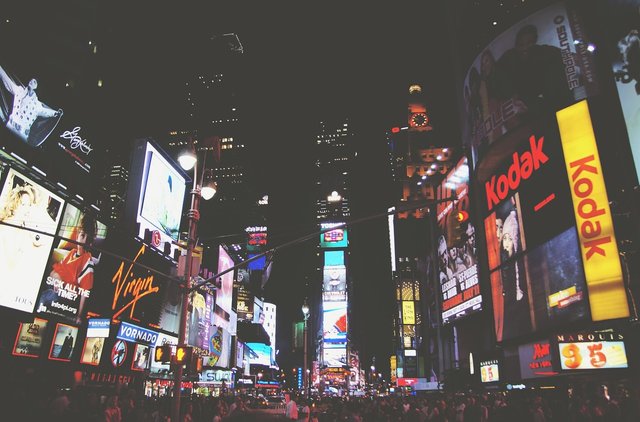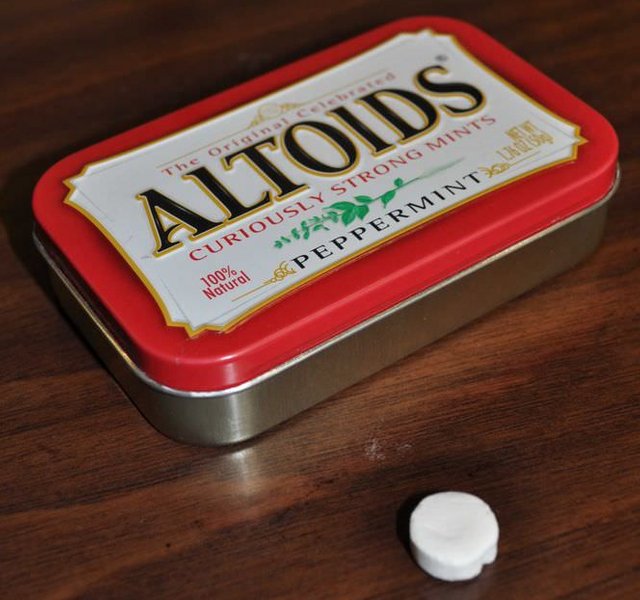About the loss of public space - free from commercialism
We are thus in the midst of a new process of the privatization of the social, of establishing new enclosures
~Slavoj Žižek, First As Tragedy, Then As Farce

Today I wanted to write about different kind of space - private and commercial space. This is the topic that is interesting for me and I believe, that it is suitable for an interesting discussion. It is about the encroachment of commercialization and privatization to another sphere of our lives. By commercialization, I don't mean whining how another artist is a sellout and is not recording songs for the love for music, but for the money et cetera. I don't mean how "back in the days it was authentic, and right now it's all for money", no. It is also not about "bad corporations" and "bad employers" are using the workers. No, it's not about that.
So about what? About where should be the healthy, proper line between public space and commercial space. Former is quite neutral from commercial influence and latter not. How sharp or fuzzy this line should be. Should a line like that, a border, even exist? Some people who like free market and libertarianism maybe would say that there is no need for that kind of line. I think that such a line should exist. If you think that it should not, I hope that this article will encourage you to discuss this topic in the comments and look at the problem from a different angle. It is also based on books by Naomi Klein, that's why I am tagging it also as "books", since I believe this article could be considered as a digest of some ideas presented in "No Logo" and "Shock Doctrine". So, let's go.
Beach, girls, and CocaCola
Naomi Klein in her 2000 bestseller called "No Logo" is presenting us the history of the concept of a brand. The brand under which the product is being sold. Before the 80s a brand was used more to distinguish a product from the competition, so the client could distinguish soap called SoapySoap from CleanBody produced by other company. Producers wanting the client to like their product, tried to deliver a quality product, so the client will remember that CleanBody soap, shaped like this or that, in a blue package with characteristic logo, is good soap. Let's call it "classic marketing".
According to Klein, because of economic problems in the 80s, marketing departments of big corporations were changing their attitude and started targeting youth. At the same time many corporations decided to change the brand from a concept that is representing the product, helps the consumer to differentiate the product from the competition to... product itself, the actual product. The brand is the product. So here is the beginning of a trend of selling the brand as a lifestyle. Since now, the ads are not saying us "Buy CocaCola, because it's delicious and tasty and refreshes you. And here is our logo so you will remember it while picking beverage on the store shelf". Since now the ads are more often telling us "Hey, look, this is Johny. He is great, handsome, rides a skateboard, is athletic and girls chase him. And look, he drinks CocaCola! Remember CocaCola = athletic, handsome, fun guy that girls love". CocaCola is not the product of ad like this, the product is the association of CocaCola with certain dreams, lifestyle, climate, halo. Who would not want to be like John? Right? So go buy a CocaCola.
Another example is Marlboro and famous "Marlboro Man", a guy from old Marlboro ads. Manly cowboy who, if we simplify things - made men buy Marlboro cigarettes because they wanted to be like him, and not for the cigarettes itself. Because of the similar reason, a cigarette industry was cooperating with Hollywood. Cinema is a powerful marketing tool - cigarettes in movies are presented as an attribute of attractive people, people that we would want to be and live like them. It was a tempting idea for marketing departments, we have to admit it.
Bad sponsor
Why did I mention this shift in marketing style? Because the involvement of corporations into presenting their brands as a representation of a certain lifestyle or even life philosophies that consumers want to pursue did not stop only at ads with fictional figures that life attractive life. Brands decided to actively engage in certain subcultures, environments, sports fields, so they will be associated with them even better on a deeper level, so the connection brand-lifestyle would be cemented. How they did that? For example by sponsoring events. We do not need to look far, for example, let's take RedBull that we associate with extreme sports, or Monster Energy drink that we associate with motorsports. Let's take Adidas who is engaged with hip-hop environments. Of course, sponsoring has its good sides for the people that are being sponsored. Many events would be impossible without corporations sponsoring them, it could be even considered a positive contribution to the public. But not always.
Sponsoring can have more side effects than benefits. As Klein noted, when time passed the sponsoring arrangements started losing the balance between the independence of institutions being sponsored and the sponsor desire to be recognized, and it became harmful to the side that was being sponsored, taking independence from them. Sometimes things go so far that the sponsor completely destroys the object that was being sponsored, because he thinks that it is easier for him to set up an event and at the same time be 100% in control, instead of sponsoring some kind of organization or community that is doing this:
And while corporate sponsorship has long been a mainstay in museums and galleries, when Phillip Morris-owned Altoids mints decided in January 1999 that it wanted to get into the game, it cut out the middleman. Rather than sponsoring an existing show, the company spent $250,000 to buy works by twenty emerging artists and launch its own Curiously Strong Collection, a traveling art exhibition that plays on the Altoids marketing slogan, "Curiously strong mints". Chris Peddy, Altoids brand manager, said, "We decided to take it to the next level"
These companies are part of a larger phenomenon explained by Lesa Ukman, executive editor of the International Events Group Sponsorship Report, the industry's bible: "From MasterCard and Dannon to Phoenix Home Life and LaSalle Bank, companies are buying properties and creating their own events. This is not because they want to get into the business. It's because proposals sponsors receive don't fit their requirements

Of course, then the balance between authenticity and commercialism is completely disrupted because in such "event" the promoter is only about the marketing, not anything else. And this is precisely why the promoter decided to create his own event instead of sponsoring one, because - "propositions that they were getting did not meet their requirements", I believe that we can read it as "sponsoring this event we weren't able to promote our brand enough at the expense of the event, because people behind this event were opposed to that, they wanted to remain autonomous, so we did our own event".
When you get too much of anything, it's not healthy. Klein believes that profit for the brands diminished also, because of the greed the connection between said brand and a lifestyle is no more authentic, even if the brand will start organizing their own events, like exhibitions:
Too often, however, the expansive nature of the branding process ends up causing the event to be usurped, creating the quintessential lose-lose situation. Not only do fans begin to feel a sense of alienation from (if not outright resentment toward) once-cherished cultural events, but the sponsors lose what they need most: a feeling of authenticity with which to associate their brands.
Sponsor's influence on the event can even have tragic effects, as critics of RedBull's marketing notice. RedBull could exert pressure on athletes so they will undertake risk acrobatics. Acrobatics that sometimes lead even to death:
some say that athletes are placed under pressure to undertake even riskier challenges to secure sponsorship. So in the case of Ueli Gegenschatz who died during a sponsorship event by Red Bull to introduce their new mobile brand ‘Red Bull mobile’. Friends of Gegenschatz and experts assume that he wouldn’t have done the stunt if he would not have been sponsored by Red Bull. The stunt was classified as life-threatening, but that didn’t discourage Red Bull from doing it. [...] Unfortunately, this is not the only reported death of an athlete in connection with Red Bull
So we can see the dangers of increasing interference of brands into the events and things that they are sponsoring. So probably some of you think - ok, what to do about it? It is not an easy question. Can events make enough money to pay for them, without sponsors? In the case of art and sports, we might be able to get some funding from the government, but some will object it saying that small government is better than big government. Even the greatest supporters of big government have to admit that this kind of sponsoring will not cover all the needs of all sport and art events. It is impossible.
So we can not demonize the idea of brands sponsoring as a whole, just as we can not ignore the importance of the money - this is the world that we live in. Although maybe the "fashion" for "authentic" events, even maybe underground ones might be a solution? This kind of events could be more "raw" in their setting because of lower finances.
State as an egg-shell - empty inside

Now I wanted to write about the second aspect of lost public space. It is the loss of institutions or their parts, which were part of the state. Most examples of things like that we can see in the USA. Standard and maybe well-known example are private prisons, prisons-for-profit. It is the industry worth 5 billion dollars. This creates some problems. First, beneficiaries of this industry might lobby for laws that result in higher, not in lower crime. Lobbying is well-developed practice in the USA and critics call it a legal bribe, not without the arguments. Effects of being profit-driven when you are operating a prison mean stricter law. Stricter not because there is a reason for it to be strict, because it will lower crime, but because someone wants to imprison more people. The difference might be subtle but important - in some cases sentencing, someone for prison time might have a reverse effect than resocialization. Stricter law is not always a better one.
Private prisons also are more eager to hide their bad deeds and what happens behind the walls. First, because they have a better reason to do so than state-owned prisons. If someone would know about the abuse that happened in such prison, it could lose the contract and so lose the source of money. Second, they do that because they have more possibilities to do that:
Aside from a handful of states where legislation extends public records disclosures to private corporations taking government money such as Connecticut, Florida, and South Carolina, private prisons are not covered by the same freedom of information and open records laws as are other government functions, making it difficult for the public to learn the most basic information about what life is like behind its doors. And even in those states, federal immigration detention centers are exempt from those state laws. This incentivizes cover-ups.

More examples of how private subcontractors who work for the government are coming into the private space could be found in "Shock Doctrine" book by Naomi Klein. They remove some responsibilities from the government, rendering it an "eggshell", empty inside. Klein argument is that when we are dealing with a shock on some area, for example, Katrina hurricane, or war on the middle east, are being used to introduce on said area extreme privatization of spheres that earlier were reserverd for a government. In New Orlean after the flood that destroyed public housing and left many people without a place to live, the houses were not rebuilt. The shock was used and mentioned houses for the poorest people were changed into houses where rent was much much higher. We could add here another example, such as privatization of drinking water intakes or so-called "Daewoo Madagascar land grab". In 2009 1.3 million hectares of land in Madagascar was leased by Daewoo, other sources. It was met with substantial criticism and awoke associations with neocolonialism. But what was interesting is that some people accused Daewoo of depraving Madagascar people from self-sufficiency so they couldn't produce their own food. Daewoo said that it will create many workplaces and so people of Madagascar could buy imported food. But it is a practice that makes third world countries even more dependent on first world countries and does not allow them to become self-sufficient. Bill Clinton saw that in 2008 when he admitted that we are guilty of treating food like a commodity instead of the vital right of poor people.
I started this article mentioning the problem of corporate sponsoring and problems related to "authenticity", "being independent of the commercial sphere" et cetera. Then I wrote about states-eggshells, abuses of private prisons and problem of hunger in the world. I would want to end it with a somehow more abstract idea, quote. Quote, that is saying us how space free from commercialism is important for us, a society, for our interpersonal bonds. It is a quote by Slavoj Žižek from a book called "First As Tragedy, Then As Farce":
In “postmodern” capitalism, the market is invading new spheres which were hitherto considered the privileged domain of the state, from education to prisons and security. When “immaterial work” (like education) is celebrated as the labor which directly produces social relations, one should not forget what this means within a commodity-economy. That new domains, hitherto excluded from the market, are now commodified. So, when in trouble, we no longer talk to a friend but pay a psychiatrist or councilor to take care of the problem. And instead of parents, paid baby-sitters and educators take care of children. We are thus in the midst of a new process of the privatization of the social, of establishing new enclosures
I hope that you liked it! Would love to hear comments and critique :)
BTW - this is my translation of my own article that I wrote about a year ago on my polish account. So it is not a plagiarism. If needed, I can confirm using "ciekawski" account that I am the same person.

source of images: main, altoids, eggshell, prison, separator
That is an amazing article .. you did a really good job .. For me it is always a bit hard to get political, but you grabed and showed us a good problem that effects all of us everywhere .. again, thats an exzellent post ;)
Thanks! I am really glad that you liked it. It's very nice for me to see a reader that leaves a comment about the article :)
I also hope to see more from you ;) .. there is a lot of mindful work in all of your posts that I really enjoy .. count me in as your follower ^^
Congratulations @inquisitiveguy! You have completed the following achievement on the Steem blockchain and have been rewarded with new badge(s) :
You can view your badges on your Steem Board and compare to others on the Steem Ranking
If you no longer want to receive notifications, reply to this comment with the word
STOPDo not miss the last post from @steemitboard:
Vote for @Steemitboard as a witness to get one more award and increased upvotes!
On Tuesdays I like to eat meals like these paired with a Witbier. Fridays are another story... evil laugh